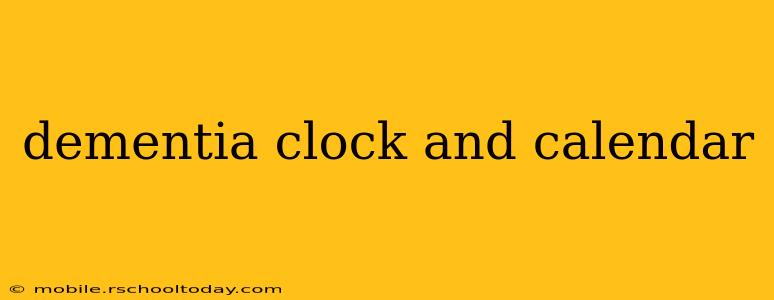Dementia significantly impacts cognitive abilities, often causing confusion regarding time and location. For individuals living with this challenging condition, a simple clock or calendar can become a source of significant distress. This is where specialized dementia clocks and calendars step in, offering a supportive and reassuring tool to improve quality of life. This article delves into the benefits, features, and considerations when choosing the right timepiece and calendar for someone with dementia.
Understanding the Challenges of Time Perception in Dementia
One of the hallmark symptoms of dementia is difficulty processing time. This isn't simply forgetting appointments; it's a deeper disorientation that can lead to anxiety, agitation, and disruptive behaviors. Individuals may lose track of the day, month, or even year, experiencing a constant sense of being lost or uncertain. Similarly, the inability to accurately perceive time can lead to difficulties with daily routines and self-care.
The Impact on Daily Life
This temporal disorientation extends beyond mere inconvenience. It can profoundly impact daily life, leading to:
- Increased anxiety and agitation: Uncertainty about the time can trigger feelings of unease and distress.
- Difficulty with self-care: Forgetting the time for meals, medication, or personal hygiene can negatively affect well-being.
- Challenges with social engagement: Confusion about appointments or planned activities can lead to social isolation.
- Increased caregiver burden: Supporting someone with dementia who struggles with time perception requires significant patience and understanding from caregivers.
The Role of Specialized Dementia Clocks and Calendars
Dementia clocks and calendars are designed to mitigate these challenges by providing clear, simple, and easily understandable information. They differ significantly from standard timepieces in several key ways:
Key Features of Effective Dementia Clocks:
- Large, Clear Numbers: Easy-to-read numerals are paramount. Avoid overly stylized or small fonts.
- High-Contrast Displays: Bold numbers on a contrasting background (e.g., black numbers on a white background) ensure optimal visibility.
- Simplified Design: A minimalist design eliminates any unnecessary visual clutter that could add to confusion.
- Analog or Digital Display?: Both have their merits. Analog clocks can help with understanding the passage of time visually, while digital clocks clearly display the current time. The best choice depends on individual preferences and cognitive abilities.
- Day/Night Indication: A clear indication of AM/PM can help avoid confusion about the time of day.
Key Features of Effective Dementia Calendars:
- Large, Clearly Labeled Days and Dates: Similar to clocks, oversized fonts and high contrast are essential.
- Visual Cues: Pictures or icons representing days of the week or months can provide additional visual aids.
- Simplified Month Display: Showing only the current month can reduce overwhelming information.
- Current Date Highlighting: Boldly highlighting the current date makes it easy to identify.
- Durable Materials: Choose a calendar made from durable materials that can withstand daily handling.
Choosing the Right Dementia Clock and Calendar
Selecting the appropriate clock and calendar requires considering the individual's specific needs and cognitive abilities. Factors to consider include:
- Level of Cognitive Impairment: The severity of dementia will influence the complexity of the timepiece and calendar needed.
- Visual Acuity: Ensure the size and contrast of the numbers and text are suitable for the individual's eyesight.
- Personal Preferences: Involve the individual in the selection process, if possible, to ensure they feel comfortable with the chosen design.
- Placement: Position the clock and calendar in a highly visible and easily accessible location.
Beyond the Clock and Calendar: Supporting Time Perception
While specialized clocks and calendars are invaluable tools, they are just one part of a broader strategy to support individuals with dementia in navigating time and space. Other helpful approaches include:
- Maintaining a Consistent Routine: Regular schedules for meals, activities, and sleep can help establish a sense of order and predictability.
- Using Visual Aids and Reminders: Pictures, notes, or other visual cues can provide additional support with daily tasks and appointments.
- Environmental Modifications: Adapting the environment to reduce confusion, such as clearly labeling rooms and providing easy-to-find items, can also be beneficial.
- Caregiver Training and Support: Educating caregivers on strategies for managing time-related challenges is crucial for providing effective support.
By understanding the challenges of time perception in dementia and utilizing appropriate tools and strategies, caregivers and healthcare professionals can significantly improve the quality of life for individuals living with this condition. Dementia clocks and calendars are a simple yet powerful intervention that can make a meaningful difference.
